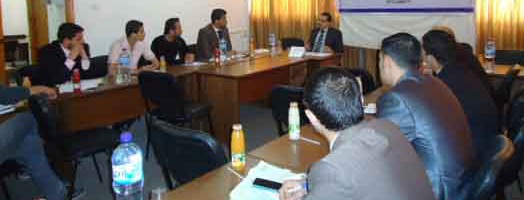Best Practices for Juvenile Justice: The Case of Palestine
Delivered by Justice Zaher Al- Saqqa, the Institute of Law (IoL) at Birzeit University
organised on 10 April 2012 a legal encounter on the Best Practices for Juvenile Justice: The
Case of Palestine. Having introduced the Birzeit Legal Encounters programme, Mrs. Lina at
Tounisi, Coordinator of the IoL Gaza Office, welcomed both the speaker and the audience.
In his opening remarks, Justice Saqqa explained that applicable laws on juvenile delinquents
are outdated and have not been amended by the Palestinian legislature. These laws have not
been upgraded so as to match recent developments introduced to the treatment of juvenile
delinquents, especially fair trial guarantees. In addition to the Law on Juvenile Offenders
No. 2 of 1937, other regulations address minors, including the Penal Law, Palestinian Penal
Procedure Law No. 3 of 2001, and Palestinian Child Law No. 7 of 2004.
In regards to juvenile rights enshrined in international conventions, Article 7 under the
United Nations Standard Minimum Rules for the Administration of Juvenile Justice (Beijing
Rules) provides: “Basic procedural safeguards such as the presumption of innocence,
the right to be notified of the charges, the right to remain silent, the right to counsel, the
right to the presence of a parent or guardian, the right to confront and cross-examine
witnesses and the right to appeal to a higher authority shall be guaranteed at all stages of
proceedings. Article 16(1) under the Beijing Rules also prescribes: “In all cases except those
involving minor offences, before the competent authority renders a final disposition prior
to sentencing, the background and circumstances in which the juvenile is living or the
conditions under which the offence has been committed shall be properly investigated.”
Justice Saqqa expounded that juvenile offences are different from those committed by
adults. In this context, the Law on Juvenile Offenders highlights that the Court should
refer to the juvenile observer’s report and remarks about the minor’s behaviour in order to
facilitate judicious adjudication of their case.
Justice Saqqa recommended that the Palestinian legislature is advised to consolidate all
regulations relating to minors. Current legal provisions are scattered across the Penal
Law, Law on Juvenile Offenders, and Child Law. Like the Egyptian Child Law No. 12 of
1996, these should be incorporated within a single law. The Palestinian Penal Procedure
Law should also be amended so that minors are cross-examined in presence of the Public
Prosecution in both misdemeanours and crimes. The Law should also provide that the
minor’s guardian be present at all stages of proceedings. Additionally, Justice Saqqa
recommended that a Juvenile Prosecution Division be established and supported with
qualified staff, including female officers. Emphasising the significant role of juvenile
observers at all stages of relevant cases, special care should be provided to minors.
The audience were interactive and interested in the subject. They made significant
interventions and raised questions. On behalf of the IoL, Mrs. Tounisi thanked the audience
for their active participation in the legal encounter.
The legal encounter was organised in partnership with the Konrad Adenauer Stiftung.











